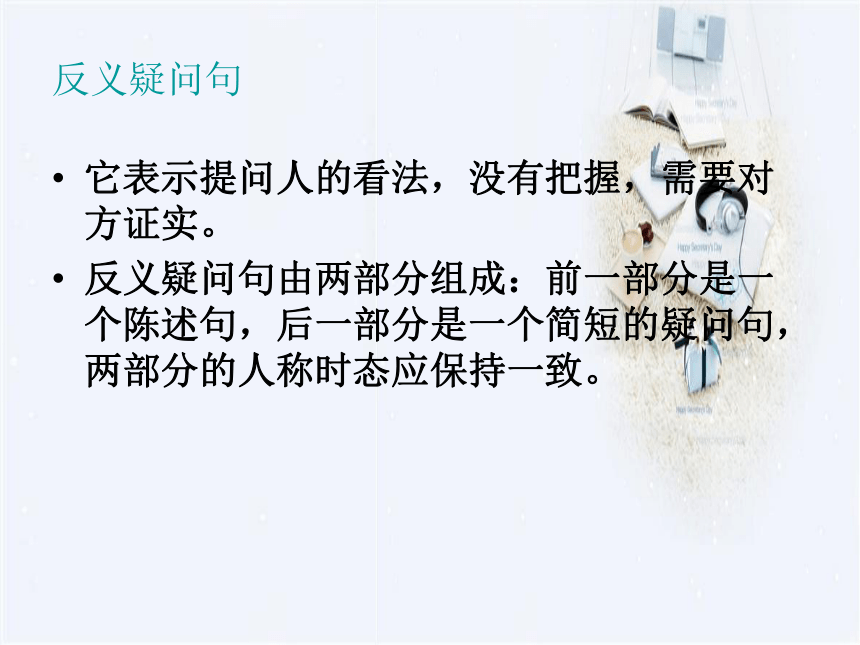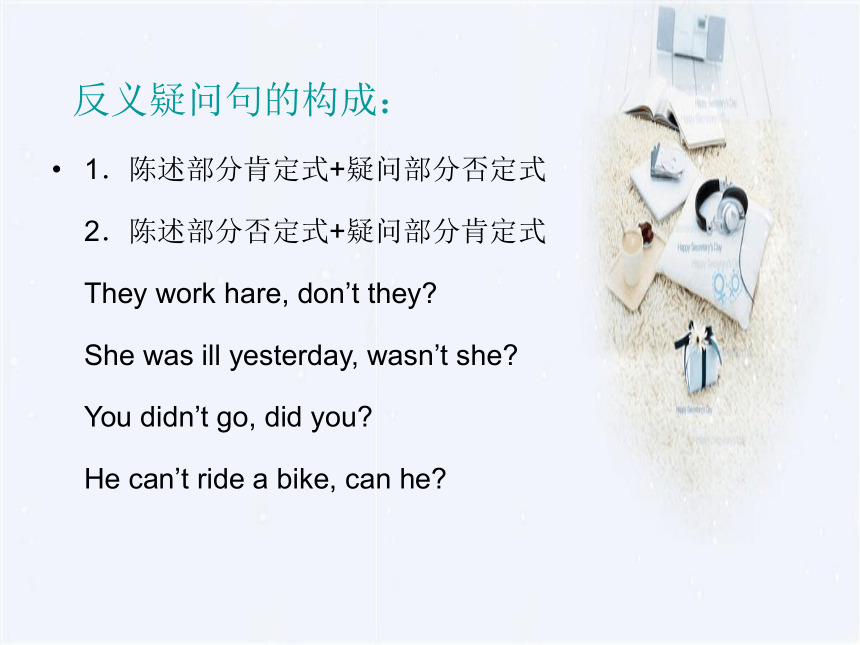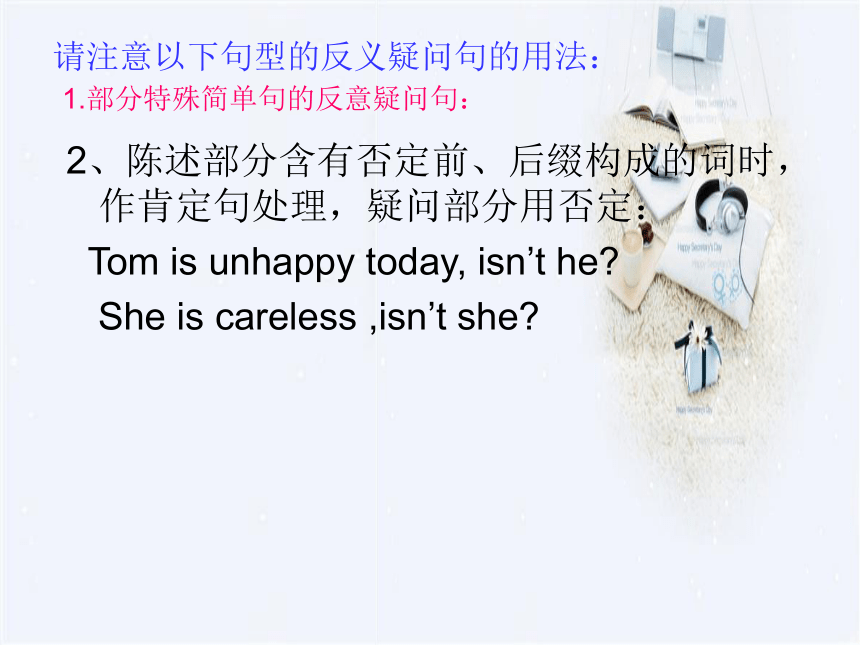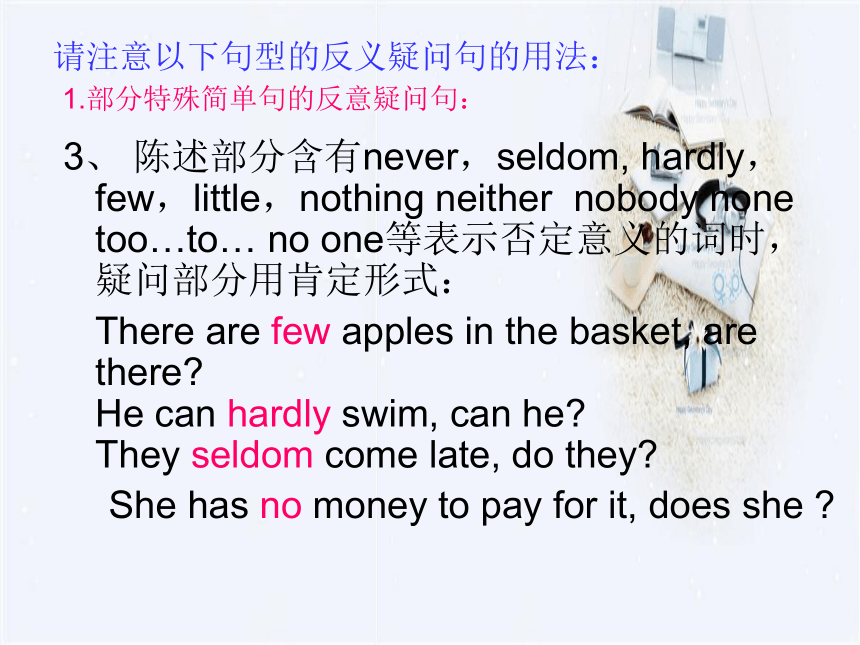反意疑问句课件
文档属性
| 名称 | 反意疑问句课件 |  | |
| 格式 | zip | ||
| 文件大小 | 44.5KB | ||
| 资源类型 | 教案 | ||
| 版本资源 | 人教新目标(Go for it)版 | ||
| 科目 | 英语 | ||
| 更新时间 | 2015-05-24 21:13:29 | ||
图片预览







文档简介
课件18张PPT。反义疑问句反义疑问句它表示提问人的看法,没有把握,需要对方证实。
反义疑问句由两部分组成:前一部分是一个陈述句,后一部分是一个简短的疑问句,两部分的人称时态应保持一致。? 1.陈述部分肯定式+疑问部分否定式? 2.陈述部分否定式+疑问部分肯定式? They work hare, don’t they?? She was ill yesterday, wasn’t she?? You didn’t go, did you?? He can’t ride a bike, can he?? 反义疑问句的构成:请注意以下句型的反义疑问句的用法: 1.部分特殊简单句的反意疑问句: ? 1、 陈述部分是 I am 时,后面用 aren’t I.
I am a student, aren’t I?
请注意以下句型的反义疑问句的用法: 1.部分特殊简单句的反意疑问句: ? 2、陈述部分含有否定前、后缀构成的词时,作肯定句处理,疑问部分用否定:
Tom is unhappy today, isn’t he?
She is careless ,isn’t she?请注意以下句型的反义疑问句的用法: 1.部分特殊简单句的反意疑问句: ? 3、 陈述部分含有never,seldom, hardly,few,little,nothing neither nobody none too…to… no one等表示否定意义的词时,疑问部分用肯定形式:
There are few apples in the basket, are there?? He can hardly swim, can he?? They seldom come late, do they??
She has no money to pay for it, does she ?请注意以下句型的反义疑问句的用法: 1.部分特殊简单句的反意疑问句: ? 4、以there 开头的陈述句有两种情况:
(1)、there be 句型时,疑问部分的主语用there,
There are some books on the table, aren’t there?
( 2)、当以表示“地点”的there 引导时,要用陈述句真实主语的相应代词形式作疑问部分的主语,
常有这两个句型:There live…… There stand……
There stand two trees on the hill, don’t they?
There lived a poor old man in the woods, didn’t he?请注意以下句型的反义疑问句的用法: 1.部分特殊简单句的反意疑问句: ? 5、陈述部分出现had better 句式时,后面仍用had 构成疑问部分。
She’d better stay in bed, hadn’t she?请注意以下句型的反义疑问句的用法: 1.部分特殊简单句的反意疑问句: ? 6、陈述部分的主语为不定式、动名词、或从句时,疑问部分的主语用 it .
Reading in bed is bad for your eyes, isn’t it?请注意以下句型的反义疑问句的用法: 1.部分特殊简单句的反意疑问句: ? 7、当陈述部分的主语为everybody nobody somebody anybody everyone 等指代人的不定代词时,疑问部分的主语
用he 或者 they. 当陈述部分的主语为everything sth nothing anything等不定代词时,疑问部分的主语用 it
Everyone is in the classroom, aren’t they?? Everything begins to grow in spring, doesn’t it?? Nobody will go, will they??
请注意以下句型的反义疑问句的用法: 1.部分特殊简单句的反意疑问句: ? 8、当neither….nor…. either….or…. both…and… not only… but also… 连接并列主语时,附加部分的主语常用 复数代词。
Neither you nor I am wrong, are we?
Not only Tom but also Bob has been there, haven’t they?
请注意以下句型的反义疑问句的用法:? 2.当陈述部分为并列句时,附近疑问句应采用就近原则,与最后一个分句相一致。
I help Lucy with her Chinese ,and she helps me with my English, doesn’t she?
请注意以下句型的反义疑问句的用法:? 3.当陈述部分为主从复合句时: 1、疑问部分须与主句保持一致:
He says his mother didn’t feel well, doesn’t he?请注意以下句型的反义疑问句的用法:? 3.当陈述部分为主从复合句时: 2. 当陈述部分是 I think I believe I guess 等主句后跟that 从句时(主句的主语必须是I), 疑问部分应和从句保持一致,并且要注意否定的转移:
I think chickens can swim, can’t they?? I think Lucy is a good girl, isn’t she?? I didn't think he was happy, was he?? I believe he will pass the exam,_________?
I don’t think he will pass the exam, _______? won’t hewill he请注意以下句型的反义疑问句的用法: 4. 当陈述部分是祈使句时: ?
1、肯定祈使句时,疑问部分用will you 或者 won’t you..
Close the door, will you / won’t you?
2、否定祈使句时,只用will you.
Don’t turn on the radio, will you??
3、以let’s 开头的祈使句用shall we.
Let’s go out for a walk, shall we??
4、以let us 开头的祈使句用 will you. Let us go our for a walk, will you??
5、以let me 开头的用 may I / will you.
Let me help you, may I / will you? 反意疑问并不难,陈述疑问句中含。
前后肯否恰相反,否定词缀不能算。
主谓时态要一致,特殊情况记心田。
实际情况来回答,再把yes和no练。
口诀 请注意以下句型的反义疑问句的用法:? 反义疑问句的回答用yes, no, 但是,当陈述部分是否定形式时,回答要按事实。如:?
He likes playing football, doesn’t he? 他喜欢踢足球,不是吗?
—Yes, he does. / No, he doesn’t. 是的。/ 不是。
—His sister didn’t attend the meeting, did she? 他妹妹没有参加会议,是吗?
—Yes, she did. / No, she didn’t. 不,她参加了。/ 是的,她没参加。
— They don’t work hard, do they?
他们不太努力工作,是吗??
— Yes, they do. 不,他们工作努力。
— No, they don’t. 对, 他们工作不努力。?
Thank you !
反义疑问句由两部分组成:前一部分是一个陈述句,后一部分是一个简短的疑问句,两部分的人称时态应保持一致。? 1.陈述部分肯定式+疑问部分否定式? 2.陈述部分否定式+疑问部分肯定式? They work hare, don’t they?? She was ill yesterday, wasn’t she?? You didn’t go, did you?? He can’t ride a bike, can he?? 反义疑问句的构成:请注意以下句型的反义疑问句的用法: 1.部分特殊简单句的反意疑问句: ? 1、 陈述部分是 I am 时,后面用 aren’t I.
I am a student, aren’t I?
请注意以下句型的反义疑问句的用法: 1.部分特殊简单句的反意疑问句: ? 2、陈述部分含有否定前、后缀构成的词时,作肯定句处理,疑问部分用否定:
Tom is unhappy today, isn’t he?
She is careless ,isn’t she?请注意以下句型的反义疑问句的用法: 1.部分特殊简单句的反意疑问句: ? 3、 陈述部分含有never,seldom, hardly,few,little,nothing neither nobody none too…to… no one等表示否定意义的词时,疑问部分用肯定形式:
There are few apples in the basket, are there?? He can hardly swim, can he?? They seldom come late, do they??
She has no money to pay for it, does she ?请注意以下句型的反义疑问句的用法: 1.部分特殊简单句的反意疑问句: ? 4、以there 开头的陈述句有两种情况:
(1)、there be 句型时,疑问部分的主语用there,
There are some books on the table, aren’t there?
( 2)、当以表示“地点”的there 引导时,要用陈述句真实主语的相应代词形式作疑问部分的主语,
常有这两个句型:There live…… There stand……
There stand two trees on the hill, don’t they?
There lived a poor old man in the woods, didn’t he?请注意以下句型的反义疑问句的用法: 1.部分特殊简单句的反意疑问句: ? 5、陈述部分出现had better 句式时,后面仍用had 构成疑问部分。
She’d better stay in bed, hadn’t she?请注意以下句型的反义疑问句的用法: 1.部分特殊简单句的反意疑问句: ? 6、陈述部分的主语为不定式、动名词、或从句时,疑问部分的主语用 it .
Reading in bed is bad for your eyes, isn’t it?请注意以下句型的反义疑问句的用法: 1.部分特殊简单句的反意疑问句: ? 7、当陈述部分的主语为everybody nobody somebody anybody everyone 等指代人的不定代词时,疑问部分的主语
用he 或者 they. 当陈述部分的主语为everything sth nothing anything等不定代词时,疑问部分的主语用 it
Everyone is in the classroom, aren’t they?? Everything begins to grow in spring, doesn’t it?? Nobody will go, will they??
请注意以下句型的反义疑问句的用法: 1.部分特殊简单句的反意疑问句: ? 8、当neither….nor…. either….or…. both…and… not only… but also… 连接并列主语时,附加部分的主语常用 复数代词。
Neither you nor I am wrong, are we?
Not only Tom but also Bob has been there, haven’t they?
请注意以下句型的反义疑问句的用法:? 2.当陈述部分为并列句时,附近疑问句应采用就近原则,与最后一个分句相一致。
I help Lucy with her Chinese ,and she helps me with my English, doesn’t she?
请注意以下句型的反义疑问句的用法:? 3.当陈述部分为主从复合句时: 1、疑问部分须与主句保持一致:
He says his mother didn’t feel well, doesn’t he?请注意以下句型的反义疑问句的用法:? 3.当陈述部分为主从复合句时: 2. 当陈述部分是 I think I believe I guess 等主句后跟that 从句时(主句的主语必须是I), 疑问部分应和从句保持一致,并且要注意否定的转移:
I think chickens can swim, can’t they?? I think Lucy is a good girl, isn’t she?? I didn't think he was happy, was he?? I believe he will pass the exam,_________?
I don’t think he will pass the exam, _______? won’t hewill he请注意以下句型的反义疑问句的用法: 4. 当陈述部分是祈使句时: ?
1、肯定祈使句时,疑问部分用will you 或者 won’t you..
Close the door, will you / won’t you?
2、否定祈使句时,只用will you.
Don’t turn on the radio, will you??
3、以let’s 开头的祈使句用shall we.
Let’s go out for a walk, shall we??
4、以let us 开头的祈使句用 will you. Let us go our for a walk, will you??
5、以let me 开头的用 may I / will you.
Let me help you, may I / will you? 反意疑问并不难,陈述疑问句中含。
前后肯否恰相反,否定词缀不能算。
主谓时态要一致,特殊情况记心田。
实际情况来回答,再把yes和no练。
口诀 请注意以下句型的反义疑问句的用法:? 反义疑问句的回答用yes, no, 但是,当陈述部分是否定形式时,回答要按事实。如:?
He likes playing football, doesn’t he? 他喜欢踢足球,不是吗?
—Yes, he does. / No, he doesn’t. 是的。/ 不是。
—His sister didn’t attend the meeting, did she? 他妹妹没有参加会议,是吗?
—Yes, she did. / No, she didn’t. 不,她参加了。/ 是的,她没参加。
— They don’t work hard, do they?
他们不太努力工作,是吗??
— Yes, they do. 不,他们工作努力。
— No, they don’t. 对, 他们工作不努力。?
Thank you !
同课章节目录
- 词法
- 名词
- 动词和动词短语
- 动词语态
- 动词时态
- 助动词和情态动词
- 非谓语动词
- 冠词
- 代词
- 数词和量词
- 形容词副词及其比较等级
- 介词和介词短语
- 连词和感叹词
- 构词法
- 相似、相近词比较
- 句法
- 陈述句
- 一般疑问句和否定疑问句
- 特殊疑问句及选择疑问句
- 反意疑问句
- 存在句(There be句型)
- 宾语从句
- 定语从句
- 状语从句
- 主谓一致问题
- 简单句
- 并列句
- 复合句
- 主谓一致
- 主、表语从句
- 名词性从句
- 直接引语和间接引语
- 虚拟语气
- 感叹句
- 强调句
- 倒装句
- 祈使句
- 句子的成分
- 句子的分类
- 题型专区
- 单项选择部分
- 易错题
- 完形填空
- 阅读理解
- 词汇练习
- 听说训练
- 句型转换
- 补全对话
- 短文改错
- 翻译
- 书面表达
- 任务型阅读
- 语法填空
- 其他资料
